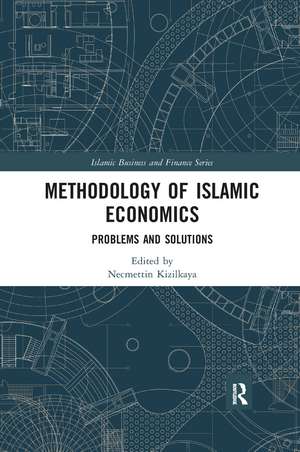Methodology of Islamic Economics: Problems and Solutions: Islamic Business and Finance Series
Editat de Necmettin Kizilkayaen Limba Engleză Paperback – 30 iun 2021
The book familiarizes the reader with knowledge of the basic maxims of the discipline. It then establishes the arguments that are presented by the proponents of religion-based economics, specifically Islam, and apprises readers about the aforementioned schools as they exist. A number of chapters consider the dimension of the dilemmas the discipline is facing, and the chronological progress of the field is reviewed, hence providing a comprehensive overview of the topic. The book deals with the issues about the origins of Islamic economics, the basic methodological questions, the use of the opportunities offered by fiqh in the methodological discussions and the main problems arising from the encounter with other cultures and civilizations. It offers practical solutions, despite the differing schools of thought, not unlike the development of conventional Economics where radical differences between Keynesian, Classical and Monetarist approaches existed. It concludes by incorporating some of the finest works that explain to the reader how Islamic economics may progress as a discipline.
This guide will provide both students and researchers in Comparative Economic Studies, Islamic Economics and Islamic Finance with an essential overview of the field.
| Toate formatele și edițiile | Preț | Express |
|---|---|---|
| Paperback (1) | 392.61 lei 6-8 săpt. | |
| Taylor & Francis – 30 iun 2021 | 392.61 lei 6-8 săpt. | |
| Hardback (1) | 771.17 lei 6-8 săpt. | |
| Taylor & Francis – 11 noi 2019 | 771.17 lei 6-8 săpt. |
Din seria Islamic Business and Finance Series
-
 Preț: 308.97 lei
Preț: 308.97 lei -
 Preț: 311.56 lei
Preț: 311.56 lei -
 Preț: 325.77 lei
Preț: 325.77 lei - 9%
 Preț: 935.29 lei
Preț: 935.29 lei -
 Preț: 326.49 lei
Preț: 326.49 lei -
 Preț: 383.13 lei
Preț: 383.13 lei -
 Preț: 280.32 lei
Preț: 280.32 lei - 16%
 Preț: 222.32 lei
Preț: 222.32 lei -
 Preț: 382.18 lei
Preț: 382.18 lei -
 Preț: 384.27 lei
Preț: 384.27 lei - 17%
 Preț: 256.87 lei
Preț: 256.87 lei -
 Preț: 383.13 lei
Preț: 383.13 lei -
 Preț: 383.13 lei
Preț: 383.13 lei -
 Preț: 402.61 lei
Preț: 402.61 lei - 18%
 Preț: 986.93 lei
Preț: 986.93 lei - 18%
 Preț: 984.30 lei
Preț: 984.30 lei -
 Preț: 155.43 lei
Preț: 155.43 lei -
 Preț: 318.84 lei
Preț: 318.84 lei - 18%
 Preț: 990.80 lei
Preț: 990.80 lei - 26%
 Preț: 762.32 lei
Preț: 762.32 lei - 18%
 Preț: 986.35 lei
Preț: 986.35 lei - 16%
 Preț: 261.14 lei
Preț: 261.14 lei -
 Preț: 327.05 lei
Preț: 327.05 lei - 18%
 Preț: 979.97 lei
Preț: 979.97 lei - 18%
 Preț: 983.56 lei
Preț: 983.56 lei - 18%
 Preț: 983.38 lei
Preț: 983.38 lei - 18%
 Preț: 981.86 lei
Preț: 981.86 lei - 18%
 Preț: 985.40 lei
Preț: 985.40 lei -
 Preț: 387.31 lei
Preț: 387.31 lei - 18%
 Preț: 983.38 lei
Preț: 983.38 lei - 25%
 Preț: 771.17 lei
Preț: 771.17 lei - 25%
 Preț: 654.89 lei
Preț: 654.89 lei - 18%
 Preț: 983.38 lei
Preț: 983.38 lei - 18%
 Preț: 983.38 lei
Preț: 983.38 lei - 18%
 Preț: 990.47 lei
Preț: 990.47 lei - 16%
 Preț: 262.55 lei
Preț: 262.55 lei - 18%
 Preț: 979.18 lei
Preț: 979.18 lei -
 Preț: 323.42 lei
Preț: 323.42 lei
Preț: 392.61 lei
Nou
Puncte Express: 589
Preț estimativ în valută:
75.17€ • 78.28$ • 62.37£
75.17€ • 78.28$ • 62.37£
Carte tipărită la comandă
Livrare economică 14-28 februarie
Preluare comenzi: 021 569.72.76
Specificații
ISBN-13: 9781032086477
ISBN-10: 1032086475
Pagini: 368
Dimensiuni: 156 x 234 x 23 mm
Greutate: 0.68 kg
Ediția:1
Editura: Taylor & Francis
Colecția Routledge
Seria Islamic Business and Finance Series
Locul publicării:Oxford, United Kingdom
ISBN-10: 1032086475
Pagini: 368
Dimensiuni: 156 x 234 x 23 mm
Greutate: 0.68 kg
Ediția:1
Editura: Taylor & Francis
Colecția Routledge
Seria Islamic Business and Finance Series
Locul publicării:Oxford, United Kingdom
Public țintă
Postgraduate and UndergraduateCuprins
Preface. Part I: Foundational Issues and Questions. 1: Methodology of Islamic economics: Is the subject worth discussing? 2: The methodology of third-generation Islamic economics. 3: The purpose of Islamic economics: Sunnatullah (Sunnah of Allah). 4: Dilemmas of Islamic economics. Part II: Foundations. 5: Usul Al-Iqtisad approach in developing the foundations of Islamic economics discipline. 6: Islamic economics as an integrated social science: Novel ideas on its foundations. Part III: Islamic economics and Fiqh. 7: Islamic economics’ methodology and Fiqh. 8: The maqasid-based methodology of Islamic economics. 9: Economic salafism: Scientific amnesia in modern Islamic economic studies. Part IV: Encounters. 10: Comparative understanding of the socio-scientific process: Islam and Occidentalism. 11: A review of methodological issues in conventional and Islamic economics: A methodology for Islamic economics. 12: Sources of dualism in modern rationalist thought: Implications for Islamic economics. 13: Hamlet’s ghost, Orientalism and the tragedy of Islamic economics. 14: Methodological trends in studies on Islamic economics in Turkey: A critical evaluation.
Notă biografică
Necmettin Kizilkaya is an Associate Professor of Islamic Law in the Faculty of Theology, Istanbul University, Turkey.
Descriere
The book deals with the issues about the origins of Islamic economics, the basic methodological questions, the use of the opportunities offered by fiqh in the methodological discussions and the main problems arising from the encounter with other cultures and civilizations.
